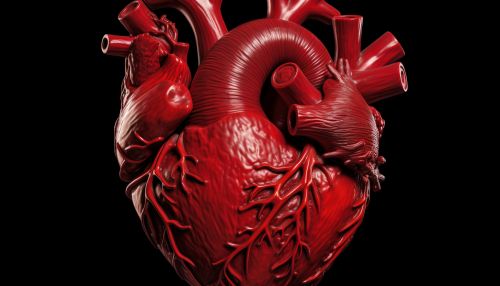Restrictive Cardiomyopathy
Overview
Restrictive cardiomyopathy (RCM) is a rare form of heart muscle disease that is characterized by restrictive filling and reduced diastolic volume of either or both ventricles with normal or near normal systolic function and wall thickness. It is a condition that is often associated with systemic diseases and can lead to significant morbidity and mortality.


Etiology
The etiology of RCM is diverse and can be classified into primary and secondary causes. Primary RCM is idiopathic or familial, while secondary RCM is associated with systemic diseases such as amyloidosis, sarcoidosis, and hemochromatosis. Other causes include radiation-induced heart disease, endomyocardial fibrosis, and Loeffler's syndrome.
Pathophysiology
The pathophysiology of RCM is characterized by an increase in stiffness of the ventricular walls, which results in impaired ventricular filling during diastole. Despite the diastolic dysfunction, systolic function is usually preserved until the late stages of the disease. The restrictive physiology leads to increased end-diastolic pressures, which can result in symptoms of congestive heart failure.
Clinical Presentation
Patients with RCM often present with symptoms of right-sided heart failure such as peripheral edema, ascites, and hepatomegaly. Other symptoms may include dyspnea on exertion, orthopnea, and paroxysmal nocturnal dyspnea. Physical examination may reveal jugular venous distention, a third heart sound (S3), and possibly a fourth heart sound (S4).
Diagnosis
The diagnosis of RCM is often challenging due to the nonspecific nature of the symptoms and the rarity of the condition. The diagnosis is usually made based on a combination of clinical presentation, echocardiography, and cardiac catheterization. Echocardiography typically shows normal or near-normal systolic function, biatrial enlargement, and impaired diastolic filling. Cardiac catheterization can confirm the diagnosis by demonstrating increased end-diastolic pressures and a dip-and-plateau pattern on the ventricular pressure tracing.
Treatment
The treatment of RCM is primarily directed at relieving symptoms and improving quality of life. This may include the use of diuretics to manage volume overload and beta-blockers to improve diastolic filling. In some cases, anticoagulation may be necessary to prevent thromboembolic events. For patients with severe symptoms that are refractory to medical therapy, heart transplantation may be considered.
Prognosis
The prognosis of RCM is generally poor, with a median survival of approximately 2-3 years from the time of diagnosis. However, the prognosis can vary widely depending on the underlying cause of the disease. For example, patients with idiopathic or familial RCM may have a better prognosis compared to those with systemic diseases such as amyloidosis or sarcoidosis.
